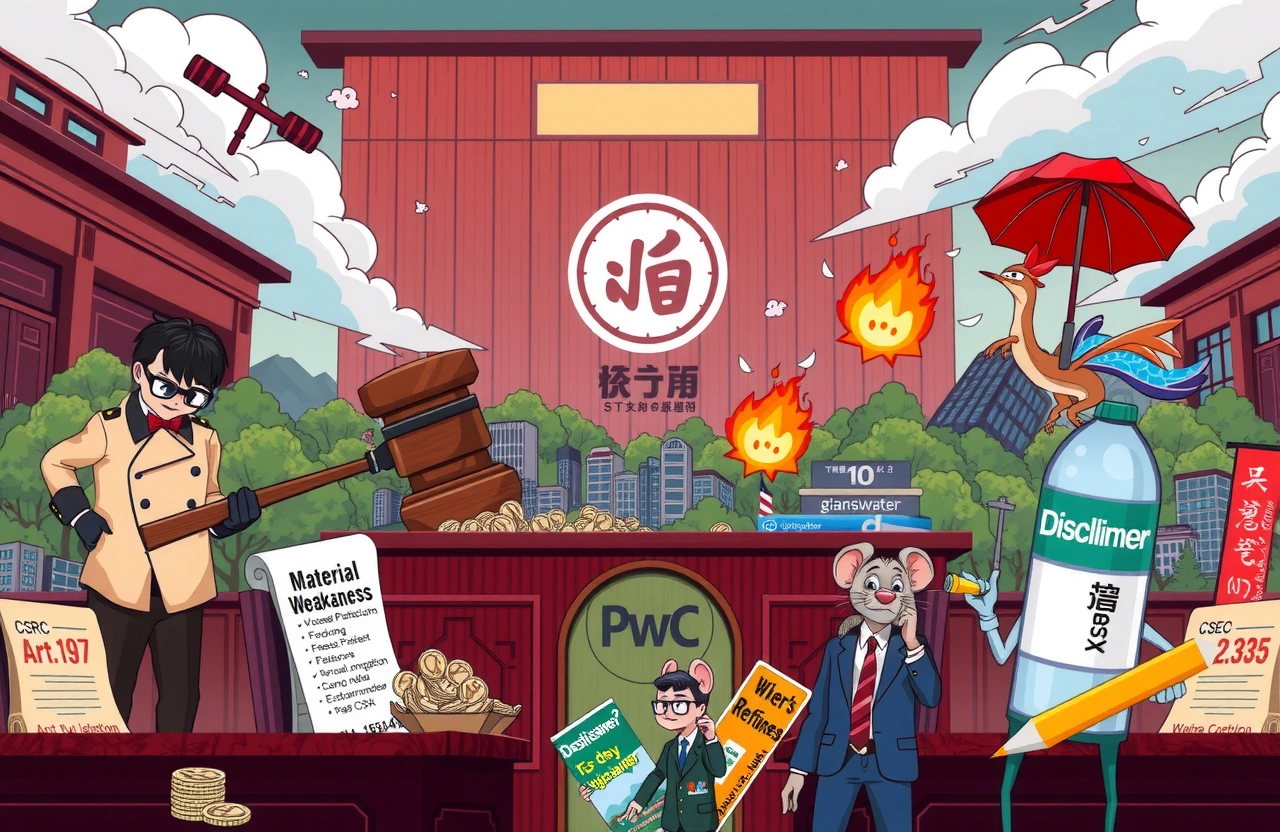Regulatory Earthquake Hits *ST Yuancheng
On July 1, 2025, *ST Yuancheng (603388) plummeted 8% in pre-market trading after announcing sudden investigations by the China Securities Regulatory Commission (CSRC). Authorities targeted both the environmental services firm and its controlling shareholder Zhu Changren (祝昌人) over suspected financial misreporting spanning five consecutive annual reports. This explosive development threatens mandatory delisting from the Shanghai Stock Exchange if substantiated—a scenario affecting thousands of retail investors. Recent accounting corrections, auditor warnings, and Zhu’s fire-sale stock auctions escalate this evolving crisis.
Anatomy of the CSRC Investigation
The CSRC formally notified the Hangzhou-based company of its inquiry on July 1, citing suspected ‘false periodic report disclosures’ under Securities Law Article 197. According to disclosure documents, investigators specifically questioned abnormal revenue patterns and discrepancies in asset valuations.
Delisting Mechanisms Triggered
Company filings explicitly confirm this *ST Yuancheng investigation activates exchange rules regarding fraudulent disclosures:
– Triggered Shanghai Stock Exchange Rule 13.5.1: Potential mandatory delisting
– Applicable penalties include permanent market bans for executives
– Previous 2023 precedent: Delistings occurred in 47% of CSRC fraud cases
Global auditing firm PwC red-flagged material weaknesses in internal controls back in April 2024, an early warning few investors heeded.
Controller Liability Exposures
Zhu Changren (祝昌人)—who controls 32% through Hangzhou Beijia Investment—faces similar charges. Securities attorneys highlight controller liability precedents:
– 2021 Honywood Group case: Controller Cheng Wei (程伟) received 8-year market ban
– Direct liability for ‘significant influence over disclosure decisions’
Financial Unraveling: A Five-Year Downward Spiral
*ST Yuancheng’s operational deterioration provides crucial context for this investigation. Once a promising Shanghai-listed environmental services provider (2017 IPO), its revenues collapsed amid municipal spending cuts. The figures expose an accelerating crisis:
Cumulative Losses Deepen
Annual net profit summaries reveal compounding damage:
– 2020: ¥92.5 million profit
– 2021: ¥46.8 million profit
– 2022: ¥-65.5 million loss
– 2023: ¥-162 million loss
– 2024: ¥-325 million loss
Q1 2025 earnings worsened further: ¥-25.3 million loss on ¥36 million revenue—down 67% year-over-year. Unlike competitors like Beijing Originwater Technology who diversified successfully, *ST Yuancheng remained overexposed to stagnant municipal contracts.
Suspicious Accounting Corrections
Regulators questioned January’s revenue restatement after exchange inquiries. Initially claiming Q4 2024 accounted for 70.2% of annual revenue (¥101 million), the company blamed ‘staff negligence’ before revising downward to 29.8%. Such volatility triggered immediate auditor disclaimers in April.
Chronic Compliance Failures
Regulatory archives expose systemic governance flaws preceding this investigation:
History of Sanctions
Both entity and controller accumulated repeated violations:
– June 2024: Zhejiang CSRC warning – Inaccurate 2022 reports
– November 2024: Exchange censure – Late capital disclosures
– January 2025: Public rebuke – Violating fundraising rules
Controller Zhu separately neglected margin-trading disclosures starting August 2023—a pattern suggestive of concealment.
Controller Assets Unravel
Evidence mounted as courts auctioned Zhu Changren’s collateralized shares:
– Four auctions January-May 2025
– June 17 sale: 4.5 million shares sold at ¥15.05 million
– Average realized price: ¥3.35/share (85% below IPO)
Shanghai Equity Court records confirm creditor seizures totaling 12.7% of Zhu’s holdings through this *ST Yuancheng investigation period.
Investor Risk Exposure
With 89% institutional ownership, implications cascade through mutual funds and pensions:
– Ping An Asset Management holds largest institutional stake (4.1%)
– CSRC data shows retail investors comprise accounts
Delisting Procedures Explained
Investors face sequential hurdles:
1. Trading suspension likely within 30 days
2. Conditional 15-day delisting review period
3. OTC transfer capability
Portfolio Protection Strategies
Specialists suggest urgent actions:
– Document June-July disclosures
– Consult class-action eligibility via CSRC portal
– Prioritize regional environmental stocks like Beijing Capital Ecology
The Shanghai Securities Association offers free appraisal clinics monthly.
Market Implications Beyond 603388
*ST Yuancheng’s regulatory ordeal demonstrates tightened enforcement intensity:
– Data: CSRC sanctions rose 34% year-over-year
– Sector focus: Environmental firms remain ultra-scrutinized
– Provincial priorities: Zhejiang leads violations prosecutions
These developments spotlight regulators’ intolerance for disclosure negligence as capital markets mature.
Safeguarding Investments Against Disclosure Risk
*ST Yuancheng shareholders face decisive weeks ahead:
– Monitor exchange suspension notices urgently
– Verify broker liquidation protocols
– Review environmental sector alternatives
Investigative outcomes will clarify whether corrective disclosures emerge or delisting ensues. Vigilance remains critical—this landmark *ST Yuancheng investigation could reshape disclosure accountability across China’s equities landscape.



